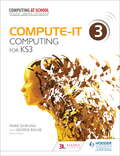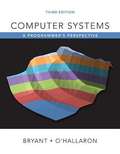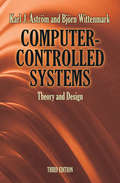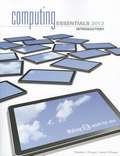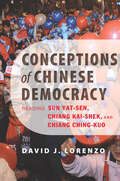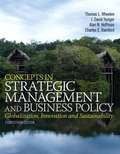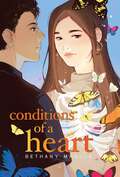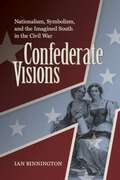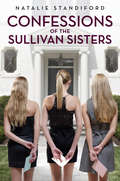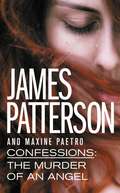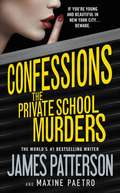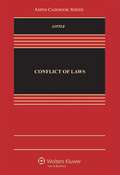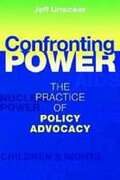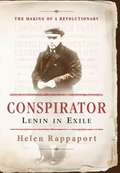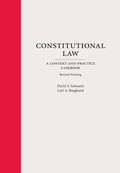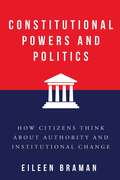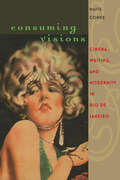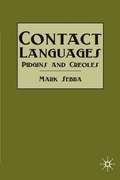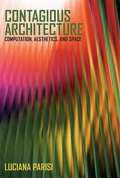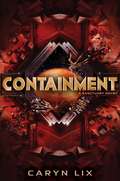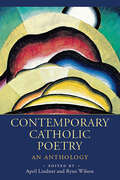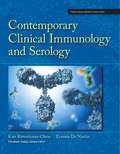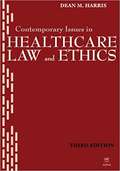- Table View
- List View
Compute-IT: Student's Book 3 - Computing for KS3
by Mark Dorling George RouseCompute-IT will help you deliver innovative lessons for the new Key Stage 3 Computing curriculum with confidence, using resources and meaningful assessment produced by expert educators. With Compute-IT you will be able to assess and record students' attainment and monitor progression all the way through to Key Stage 4. Developed by members of Computing at School, the national subject association for Computer Science, and a team of Master Teachers who deliver CPD through the Network of Excellence project funded by the Department for Education, Compute-IT provides a cohesive and supportive learning package structured around the key strands of Computing. Creative and flexible in its approach, Compute-IT makes Computing for Key Stage 3 easy to teach, and fun and meaningful to learn, so you can:Follow well-structured and finely paced lessons along a variety of suggested routes through Key Stage 3Deliver engaging and interesting lessons using a range of files and tutorials provided for a range of different programming languages Ensure progression throughout Key Stage 3 with meaningful tasks underpinned by unparalleled teacher and student support Assess students' work with confidence, using ready-prepared formative and summative tasks that are mapped to meaningful learning outcomes and statements in the new Programme of StudyCreative and flexible in its approach, Compute-IT makes Computing for Key Stage 3 easy to teach, and fun and meaningful to learn. This is the third title in the Compute-IT course, which comprises three Student's Books, three Teacher Packs and a range of digital teaching and learning resources delivered through Dynamic Learning.
Computer Systems: A Programmer's Perspective, Third Edition
by Randal E. Bryant David R. O'HallaronThis book (known as CS: APP) is for computer scientists, computer engineers, and others who want to be able to write better programs by learning what is going on "under the hood" of a computer system.
Computer-Controlled Systems: Theory and Design (Dover Books on Electrical Engineering)
by Dr Karl J Åström Björn WittenmarkPractically all modern control systems are based upon microprocessors and complex microcontrollers that yield high performance and functionality. This volume focuses on the design of computer-controlled systems, featuring computational tools that can be applied directly and are explained with simple paper-and-pencil calculations. The use of computational tools is balanced by a strong emphasis on control system principles and ideas. Extensive pedagogical aids include worked examples, MATLAB macros, and a solutions manual (see inside for details).The initial chapter presents a broad outline of computer-controlled systems, followed by a computer-oriented view based on the behavior of the system at sampling instants. An introduction to the design of control systems leads to a process-related view and coverage of methods of translating analog designs to digital control. Concluding chapters explore implementation issues and advanced design methods.
Computing Essentials 2013 Introductory Edition: Make IT Work for You
by Timothy J. O'Leary Linda I. O'LearyComputing Essentials 2013 allows you to Make IT Work for You through relevant Explorations, Ethics and Environment themes throughout each chapter.
Conceptions of Chinese Democracy: Reading Sun Yat-sen, Chiang Kai-shek, and Chiang Ching-kuo
by David J. LorenzoClose attention to the writings of the founding fathers of the Republic of China on Taiwan shows that democracy is indeed compatible with Chinese culture.Conceptions of Chinese Democracy provides a coherent and critical introduction to the democratic thought of three fathers of modern Taiwan—Sun Yat-sen, Chiang Kai-shek, and Chiang Ching-kuo—in a way that is accessible and grounded in broader traditions of political theory.David J. Lorenzo’s comparative study allows the reader to understand the leaders’ democratic conceptions and highlights important contradictions, strengths, and weaknesses that are central to any discussion of Chinese culture and democratic theory. Lorenzo further considers the influence of their writings on political theorists, democracy advocates, and activists on mainland China.Students of political science and theory, democratization, and Chinese culture and history will benefit from the book's substantive discussions of democracy, and scholars and specialists will appreciate the larger arguments about the influence of these ideas and their transmission through time.
Concepts in Strategic Management and Business Policy: Globalization, Innovation and Sustainability
by Thomas L. Wheelen J. David Hunger Alan N. Hoffman Charles E. BamfordFor Strategic Management and Business Policy courses. Class-tested approach to Strategy with new focus on environmental sustainability. Wheelen and Hunger's class-tested approach to teaching Strategy is brought into sharper focus with a new theme: environmental sustainability. By bringing the sustainability theme into focus, this text equips students with the strategic concepts they will need to know as they face issues such as climate change, global warming and energy availability.
Conditions of a Heart
by Bethany MangleFor fans of Talia Hibbert and Lynn Painter comes a funny and unflinchingly honest story about a teen who must come to terms with her disability and what it means for her identity, her love life, and her future.Brynn Kwan is desperate for her high school persona to be real. That Brynn is head of the yearbook committee, the favorite for prom queen, and definitely not crumbling from a secret disability that&’s rapidly wearing her down. If no one knows the truth about her condition, Brynn doesn&’t have to worry about the pitying looks or accusations of being a faker that already destroyed her childhood friendships. She&’s even willing to let go of her four-year relationship with her first love, Oliver, rather than reveal that a necessary surgery was the reason she ignored his existence for the entire summer. But after Brynn tries to break up a fight at a pep rally and winds up barred from all her clubs and senior prom, she has nothing left to prop up her illusion of being just like everyone else. During a week-long suspension from school, she realizes that she doesn&’t quite recognize the face in the mirror—and it&’s not because of her black eye from the fight. With a healthy sister who simply doesn&’t understand and a confused ex-boyfriend who won&’t just take a hint and go away like a normal human being, Brynn begins to wonder if it&’s possible to reinvent her world by being the person she thought no one wanted: herself.
Confederate Visions: Nationalism, Symbolism, and the Imagined South in the Civil War (A Nation Divided)
by Ian BinningtonNationalism in nineteenth-century America operated through a collection of symbols, signifiers citizens could invest with meaning and understanding. In Confederate Visions, Ian Binnington examines the roots of Confederate nationalism by analyzing some of its most important symbols: Confederate constitutions, treasury notes, wartime literature, and the role of the military in symbolizing the Confederate nation.Nationalisms tend to construct glorified pasts, idyllic pictures of national strength, honor, and unity, based on visions of what should have been rather than what actually was. Binnington considers the ways in which the Confederacy was imagined by antebellum Southerners employing intertwined mythic concepts—the "Worthy Southron," the "Demon Yankee," the "Silent Slave"—and a sense of shared history that constituted a distinctive Confederate Americanism. The Worthy Southron, the constructed Confederate self, was imagined as a champion of liberty, counterposed to the Demon Yankee other, a fanatical abolitionist and enemy of Liberty. The Silent Slave was a companion to the vocal Confederate self, loyal and trusting, reliable and honest.The creation of American national identity was fraught with struggle, political conflict, and bloody Civil War. Confederate Visions examines literature, newspapers and periodicals, visual imagery, and formal state documents to explore the origins and development of wartime Confederate nationalism.
Confessions of the Sullivan Sisters
by Natalie StandifordFrom the author of HOW TO SAY GOODBYE IN ROBOT, the story of a fractured family and three sisters' secretsThe Sullivan sisters have a big problem. On Christmas Day their rich and imperious grandmother gathers the family and announces that she will soon die . . .and has cut the entire family out of her will. Since she is the source of almost all their income, this means they will soon be penniless. Someone in the family has offended her deeply. If that person comes forward with a confession of her (or his) crime, submitted in writing to her lawyer by New Year's Day, she will reinstate the family in her will. Or at least consider it.And so the confessions begin....
Confessions: The Murder of an Angel (Confessions #4)
by James Patterson Maxine PaetroIn the dramatic conclusion of the #1 New York Times bestselling series, Tandy Angel's next murder case could be her own!Tandy Angel is losing her mind-or so she thinks. Even as she's forced to fight for the family company, she's imagining new dangers in every shadow. And as her detective prowess is called into question and her paranoia builds, she has to face the very real possibility that the stalker she's convinced will take her life could be all in her head-or the very real danger that finally brings her down.
Confessions: The Private School Murders (Confessions #2)
by James Patterson Maxine PaetroIn the sequel to the #1 New York Times bestseller Confessions of a Murder Suspect, James Patterson keeps the confessions coming breathlessly as Tandy Angel delves deeper into her own dark history.Wealthy young women are being murdered on Manhattan's exclusive Upper West Side, and the police aren't looking for answers in the right places. Enter Tandy Angel. The first case she cracked was the mystery of her parents' deaths. Now, while she's working to exonerate her brother of his glamorous girlfriend's homicide, she's driven to get involved in the West Side murder spree. One of the recent victims was a student at Tandy's own elite school. She has a hunch it may be the work of a serial killer, but the NYPD isn't listening to her . . . and Tandy can't ignore the disturbing fact that she perfectly fits the profile of the killer's targets. Can she untangle the mysteries in time? Or will she be the next victim?
Conflicts of Law: Cases, Materials, and Problems (Aspen Casebook Series)
by Laura E. LittleAward-winning teacher Laura Little offers a progressive, innovative approach to teaching complex material in the new casebook, Conflict of Laws. In a subject where there are few "right" answers and plenty of room for debate, this casebook offers a contemporary alternative to the subject by connecting coverage of key issues and concepts to law practice using modern cases-and-problem pedagogy. Features: Award-winning teacher and respected author Laura Little brings her considerable expertise in federal courts, conflict of laws, and constitutional law to the subject. Well-balanced casebook presents the deep jurisprudential lessons imbedded in the conflict of laws subject matter. Proven cases-and-problems pedagogy helps students apply concepts. Maintains a clear presentation of doctrines relevant to current law practice. Thematic approach puts conflicts of law in the context of actual issues confronted in law practice. Clear, straightforward writing avoids the "hide the ball" approach of many other books and maximizes accessibility to difficult material. Innovative organization, beginning with personal jurisdiction, follows the way issues arise in litigation and highlights the importance of forum selection. Highly adaptable modular presentation allows professors to customize approach. Contemporary cases and hypotheticals allow students to apply rules to current situations, while hallmark cases maintain continuity with the development of the discipline. Full coverage of current topics such as Internet issues, same-sex marriage, choice of law clauses, and class actions. International and comparative materials cover global aspects of conflicts. Emphasis on the Restatement (Second) of Conflicts, now the predominant United States approach but insufficiently covered in most other texts. Online PowerPoint slides, charts, and diagrams support teachability. Comprehensive Teachers Manual includes answers to every problem, teaching suggestions, sample syllabi, and a graphical depiction of each main case, as well as unique insights and case backgrounds.
Confronting Power: The Practice of Policy Advocacy
by Jeff UnsickerConfronting Power provides an academically rigorous, yet practical and comprehensive framework and sets of concepts for planning, implementing and evaluating policy advocacy. Based on the author's experiences both as teacher and activist, the framework is general enough to be relevant for advocacy in a variety of sectors such as poverty alleviation, human rights and the environment, in different national and cultural contexts, and at levels ranging from influencing a town council to transnational institutions such as the World Bank. The book grounds the concepts via a series of case studies, which themselves illustrate a range of different advocacy campaigns in both the Global South and the United States. Designed to be both a textbook and a guide for practical action, Confronting Power should become an essential component of every teacher and social advocate's tool kit.
Conspirator: Lenin in Exile
by Helen RappaportThe father of Communist Russia, Vladimir Ilych Lenin now seems to have emerged fully formed in the turbulent wake ofWorldWar I and the Russian Revolution. But Lenin’s character was in fact forged much earlier, over the course of years spent in exile, constantly on the move, and in disguise. In Conspirator, Russian historian Helen Rappaport narrates the compelling story of Lenin’s life and political activities in the years leading up to the revolution. As he scuttled between the glittering capital cities of Europe--from London and Munich to Vienna and Prague--Lenin found support among fellow émigrés and revolutionaries in the underground movement. He came to lead a ring of conspirators, many of whom would give their lives in service to his schemes. A riveting account of Lenin’s little-known early life, Conspirator tracks in gripping detail the formation of one of the great revolutionaries of the twentieth century.
Constitutional Law: A Context and Practice Casebook
by Lori A. Ringhand David S. SchwartzThis innovative casebook takes constitutional law beyond the realm of academic theory and enables students to approach the topic as practicing attorneys as well as legal thinkers. The classic cases are presented, but instructors also are given the opportunity to use practice problems, in-depth case studies, and non-case materials to explore the richness of constitutional decision making as it actually occurs in today's world. An array of "the constitution outside the courts" materials are provided, such as opinions from the Office of Legal Counsel, Congressional debates about judicial selection, and political science scholarship about judicial decision making. A full teacher's manual with electronic teaching notes is included, as are suggested syllabi for teaching the material as either a single comprehensive course or in a two-course package separating federalism and structural issues from civil rights and liberties. This book is part of the Context and Practice Series, edited by Michael Hunter Schwartz, Professor of Law & Associate Dean for Faculty and Academic Development, Washburn University School of Law.
Constitutional Powers and Politics: How Citizens Think about Authority and Institutional Change (Constitutionalism and Democracy)
by Eileen BramanThe relationship between public opinion and the actions of institutions such as the Supreme Court has come under increased scrutiny in recent years. In this timely book, Eileen Braman explores how American citizens think about government across all three branches, applying a rigorous political scientific methodology to explore why citizens may support potentially risky changes to our governing system.As Braman highlights, Americans value institutions that they perceive as delivering personal and societal gains, and citizens who see these institutions as delivering potential losses are more supportive of fundamental constitutional change. In the face of growing resentment of government and recurring warnings of constitutional crisis, Braman offers a hopeful note: her findings suggest that politicians can channel discontent toward meaningful reform and the healthy evolution of our democratic system.
Consuming Visions: Cinema, Writing, and Modernity in Rio de Janeiro (New World Studies)
by Maite CondeConsuming Visions explores the relationship between cinema and writing in early twentieth-century Brazil, focusing on how the new and foreign medium of film was consumed by a literary society in the throes of modernization. Maite Conde places this relationship in the specific context of turn-of-the-century Rio de Janeiro, which underwent a radical transformation to a modern global city, becoming a concrete symbol of the country's broader processes of change and modernization. Analyzing an array of literary texts, from journalistic essays and popular women's novels to anarchist treatises and vaudeville plays, the author shows how the writers' encounters with the cinema were consistent with the significant changes taking place in the city.The arrival and initial development of the cinema in Brazil were part of the new urban landscape in which early Brazilian movies not only articulated the processes of the city's modernization but also enabled new urban spectators—women, immigrants, a new working class, and a recently liberated slave population—to see, believe in, and participate in its future. In the process, these early movies challenged the power of the written word and of Brazilian writers, threatening the hegemonic function of writing that had traditionally forged the contours of the nation's cultural life. An emerging market of consumers of the new cultural phenomena—popular theater, the department store, the factory, illustrated magazines—reflected changes that not only modernized literary production but also altered the very life and everyday urban experiences of the population. Consuming Visions is an ambitious and engaging examination of the ways in which mass culture can become an agent of intellectual and aesthetic transformation.
Contact Languages: Pidgins and Creoles
by Mark SebbaIn the last three decades, the field of pidgin and creole studies has become recognized as central to modern linguistics. Designed for the student without previous knowledge of the field, this book builds chapter by chapter to give a compregensive overview of current thinking and research on pidgins and creoles.
Contagion
by Joanne DahmeRose Dugan is a young and beautiful woman living in Philadelphia in the late 19th century passionate about keeping PhiladelphiaOCOs water reservoir clean and healthy. But when Rose starts receiving threatening letters, warning her to convince her husband to shut down his plans for a water filtration system or else, things take a turn for the worse. A conspicuous murder and butting heads cause Rose to search for the culprit, the truth, and a way to keep the people of Philadelphia safe from contagion in more ways than one. "
Contagious Architecture: Computation, Aesthetics and Space
by Luciana ParisiIn Contagious Architecture, Luciana Parisi offers a philosophical inquiry into the status of the algorithm in architectural and interaction design. Her thesis is that algorithmic computation is not simply an abstract mathematical tool but constitutes a mode of thought in its own right, in that its operation extends into forms of abstraction that lie beyond direct human cognition and control. These include modes of infinity, contingency, and indeterminacy,as well as incomputable quantities underlying the iterative process of algorithmic processing. The main philosophical source for the project is Alfred North Whitehead, whose process philosophy is specifically designed to provide a vocabulary for "modes of thought"exhibiting various degrees of autonomy from human agency even as they are mobilized by it. Because algorithmic processing lies at the heart of the design practices now reshaping our world -- from the physical spaces of our built environment to the networked spaces of digital culture -- the nature of algorithmic thought is a topic of pressing importance that reraises questions of control and,ultimately, power. Contagious Architecture revisits cybernetic theories of control and information theory's notion of the incomputable in light of this rethinking of the role of algorithmic thought. Informed by recent debates in political and cultural theory around the changing landscape of power, it links the nature of abstraction to a new theory of power adequate to the complexities of the digital world.
Containment (A Sanctuary Novel)
by Caryn LixIn the thrilling second book in a series best described as Alien meets The Darkest Minds, Kenzie and her friends find themselves on the run and up against another alien invasion headed towards Earth.They may have escaped Sanctuary, but Kenzie and her friends are far from safe. Ex-Omnistellar prison guard Kenzie and her superpowered friends barely made it off Sanctuary alive. Now they&’re stuck in a stolen alien ship with nowhere to go and no one to help them. Kenzie is desperate for a plan, but she doesn&’t know who to trust anymore. Everyone has their own dark secrets: Omnistellar, her parents, even Cage. Worse still, she&’s haunted by memories of the aliens who nearly tore her to shreds—and forced her to accidentally kill one of the Sanctuary prisoners, Matt. When Kenzie intercepts a radio communication suggesting that more aliens are on their way, she knows there&’s only one choice: They must destroy the ship before the aliens follow the signal straight to them. Because if the monstrous creatures who attacked Sanctuary reach Earth, then it&’s game over for humanity. What Kenzie doesn&’t know is that the aliens aren&’t the only ones on the hunt. Omnistellar has put a bounty on Kenzie&’s head—and the question is whether the aliens or Omnistellar get to her first.
Contemporary Catholic Poetry: An Anthology
by April Lindner Ryan WilsonFeaturing 23 contemporary Catholic poets, from Julia Alvarez and Carolyn ForchÉ to Timothy Murphy and Franz Wright, this anthology is an essential collection that captures the spectrum of the Catholic experience.
Contemporary Clinical Immunology and Serology
by Kate Rittenhouse-Olson Ernesto De NardinThis complete, up-to-date introduction to immunology takes students from basic vocabulary through common immunoassays to closer consideration of the specific diseases that require immunologic methods of diagnosis. CLINICAL IMMUNOLOGY AND SEROLOGY presents today's newest professional techniques, thoroughly preparing students to work in modern clinical immunology laboratories, understand the data generated there, and apply the conclusions to deliver superior patient care. Full-color charts and illustrations engage students and enhance comprehension, and the text's content has been extensively classroom-tested. It contains the most up-to-date information to accurately reflect what in done in the clinical immunology laboratory. Every chapter contains review and critical thinking questions, as well as a detailed case study.
Contemporary Issues In Healthcare Law And Ethics
by Dean M. HarrisContemporary Issues in Healthcare Law and Ethics, Third Edition, examines the most important legal and ethical issues in healthcare and presents essential information that will help you learn to identify and tackle potential legal problems.
